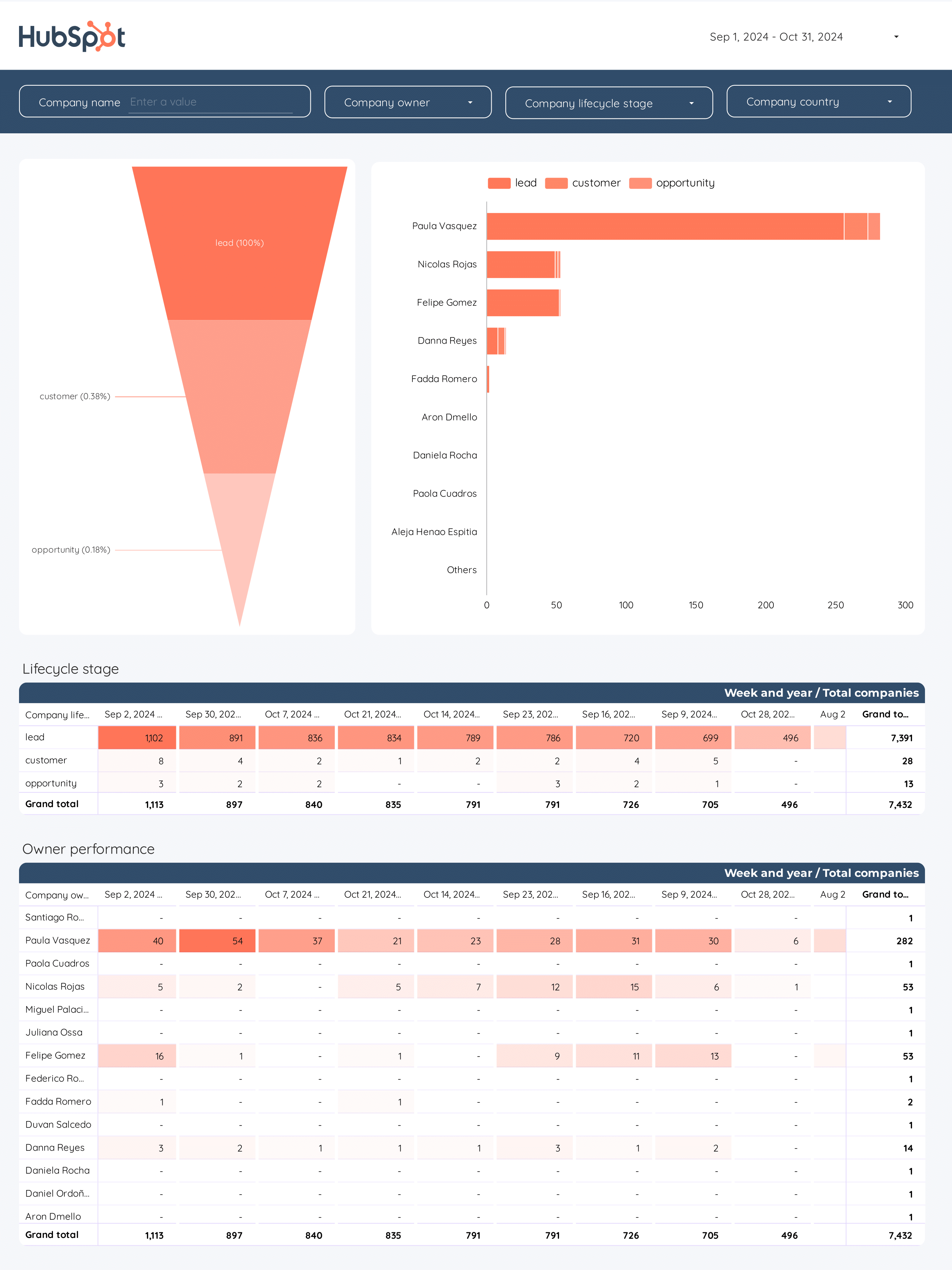
B2B Funnel Dashboard template
The B2B Funnel Dashboard template is designed for businesses using HubSpot to track and manage their sales funnels effectively. This template provides a structured view of your sales process, allowing you to monitor each stage of the funnel with precision.
With this dashboard, you can:
- Visualize the entire sales funnel from lead generation to deal closure.
- Analyze conversion rates at each stage to identify potential bottlenecks.
- Track the performance of sales teams and individual representatives.
- Integrate seamlessly with HubSpot for real-time data updates.
This template is essential for B2B companies aiming to optimize their sales strategies and improve their overall sales process management.
Facebook Ads budget tracking and pacing Dashboard template
The Facebook Ads Budget Tracking and Pacing Dashboard is designed for PPC professionals managing Facebook Ads campaigns. This dashboard provides a clear overview of your ad spend and helps ensure your campaigns stay on track.
With this dashboard, you can:
- Monitor daily spend against your allocated budget to avoid overspending.
- Track pacing to ensure your campaigns are on schedule to meet monthly targets.
- Analyze spend trends to identify patterns and adjust strategies accordingly.
Utilize this tool to maintain control over your Facebook Ads budget and optimize your PPC strategy effectively.
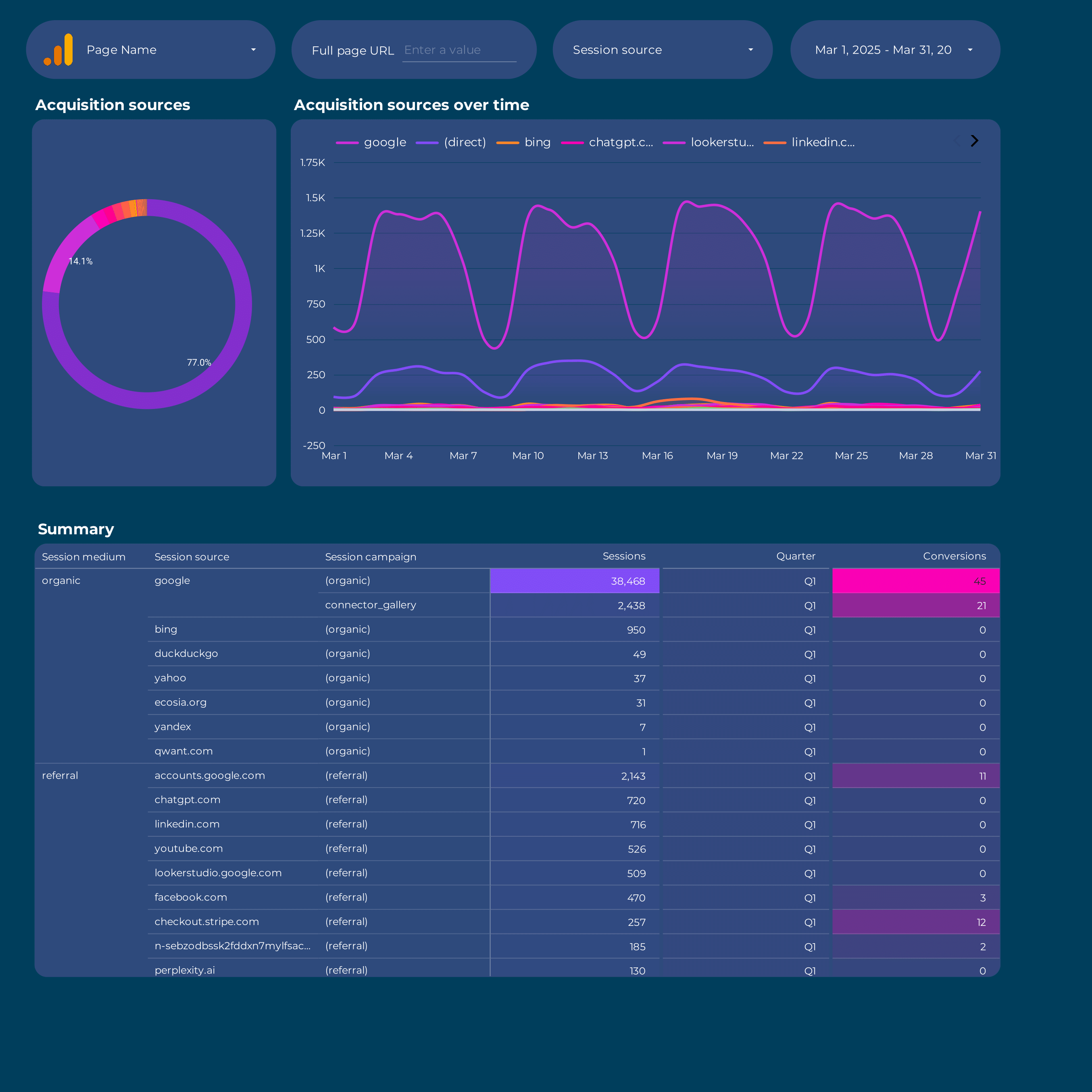
Google Analytics 4 acquisition Dashboard template
The Google Analytics 4 Acquisition Dashboard template provides a detailed overview of your website’s traffic sources and user acquisition channels. This dashboard is designed to help marketers and analysts understand how users are finding and interacting with your site.
Core Features:
- Traffic Source Analysis: Break down of user acquisition by channels such as organic search, paid search, direct, referral, and social media.
- User Engagement Metrics: Track user interactions and engagement levels across different acquisition sources.
- Attribution Insights: Analyze the contribution of various channels to conversions and user journeys.
- Real-Time Data: Monitor live data to see how current campaigns are performing.
This dashboard leverages Google Analytics 4’s advanced tracking capabilities to provide actionable insights into your marketing strategies and user acquisition efforts.
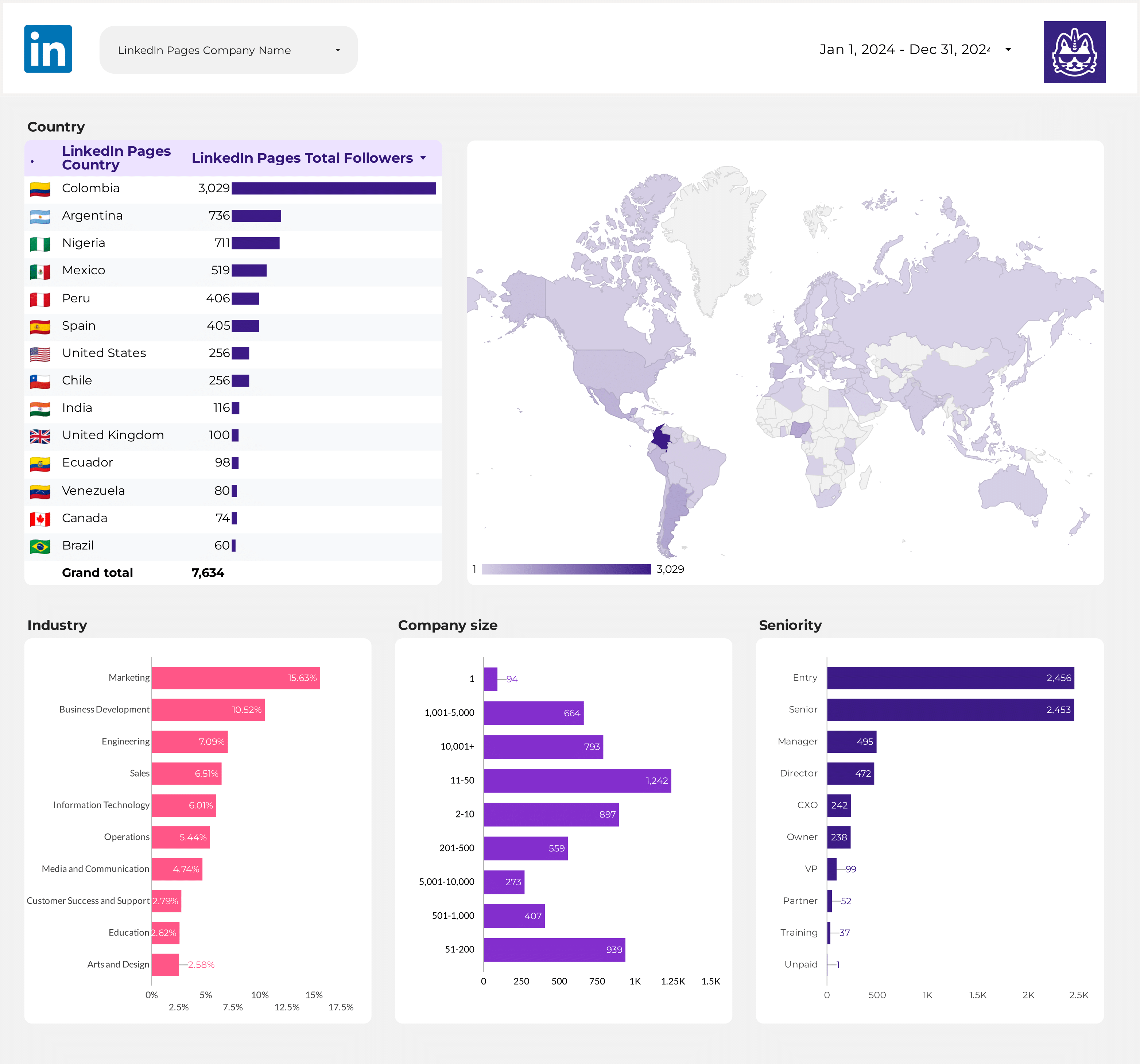
LinkedIn Pages Dashboard template
The LinkedIn Pages Dashboard Template is designed for social media managers and marketing professionals to effectively manage and analyze LinkedIn Pages performance. This template provides a structured approach to monitor and report on various metrics.
Features include:
- Engagement Tracking: Monitor likes, comments, and shares to understand audience interaction.
- Follower Growth Analysis: Track changes in follower count over time to assess growth trends.
- Content Performance Metrics: Evaluate the reach and impact of posts to optimize content strategy.
- Demographic Insights: Analyze audience demographics to tailor content to specific segments.
This template is an essential tool for data-driven decision-making, providing a clear view of LinkedIn Pages activities and outcomes.
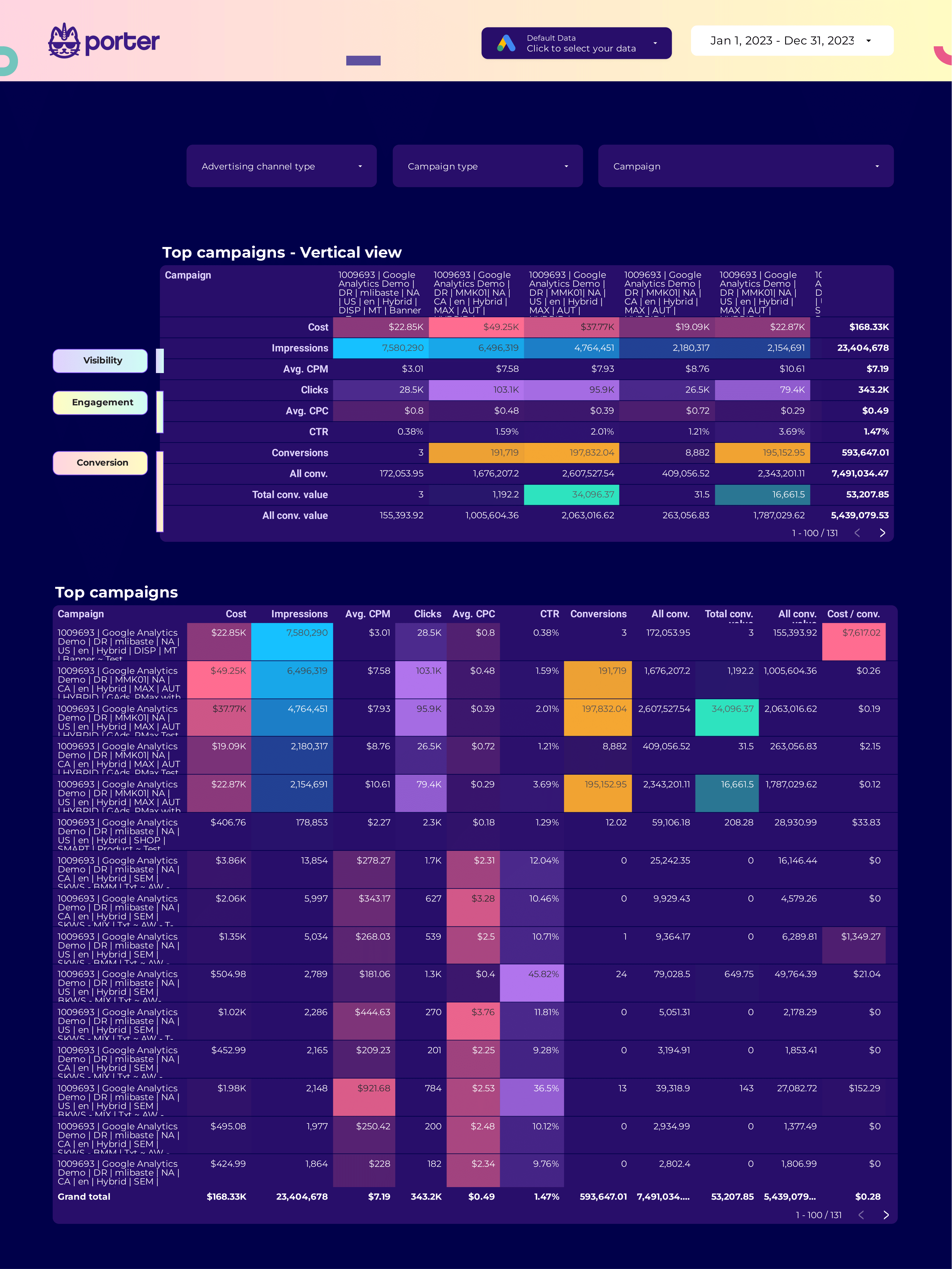
SEM Dashboard template
The SEM Dashboard Template is designed for professionals managing PPC and Paid Media campaigns, specifically focusing on Google Ads. This template provides a structured approach to monitor and analyze campaign performance.
Key features include:
- Performance Metrics: Track essential metrics such as Click-Through Rate (CTR), Cost Per Click (CPC), and Conversion Rate.
- Budget Tracking: Monitor daily and monthly spend to ensure alignment with financial goals.
- Ad Group Analysis: Evaluate the performance of different ad groups to identify top performers.
- Keyword Insights: Analyze keyword performance to optimize bidding strategies.
This template serves as a foundational tool for managing and optimizing Google Ads campaigns, providing actionable insights for data-driven decision-making.
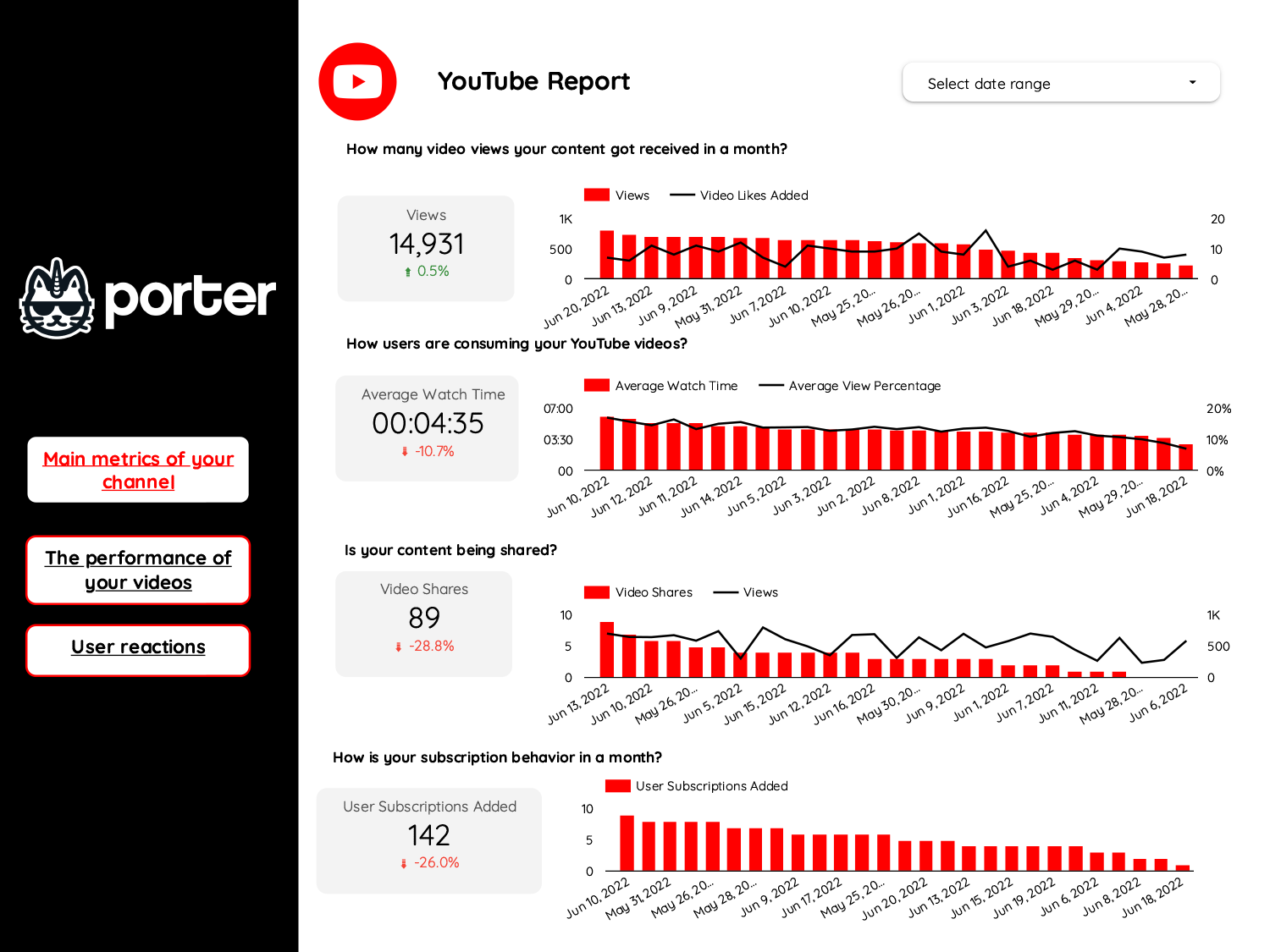
Youtube Dashboard template
Introducing the YouTube Dashboard Template—a powerful tool designed for social media managers and SEO specialists. This template provides a structured approach to managing and analyzing your YouTube channel’s performance.
With this dashboard, you can:
- Track subscriber growth and engagement metrics.
- Analyze video performance with detailed analytics.
- Monitor SEO metrics to optimize video visibility.
- Organize content strategy with a content calendar.
Designed for seamless integration with your existing workflow, this template is an essential tool for maximizing your YouTube channel’s potential.
B2B KPI tracker Dashboard template
The B2B KPI Tracker Dashboard Template is designed for businesses using HubSpot to monitor and analyze their performance metrics effectively. This template provides a structured approach to track essential KPIs, ensuring that your business objectives align with your operational activities.
With this dashboard, you can:
- Visualize critical performance indicators in real-time.
- Integrate seamlessly with HubSpot for automated data updates.
- Customize the dashboard to focus on specific metrics relevant to your business goals.
Utilize this template to maintain a clear overview of your business’s performance, facilitating data-driven decision-making and strategic planning.
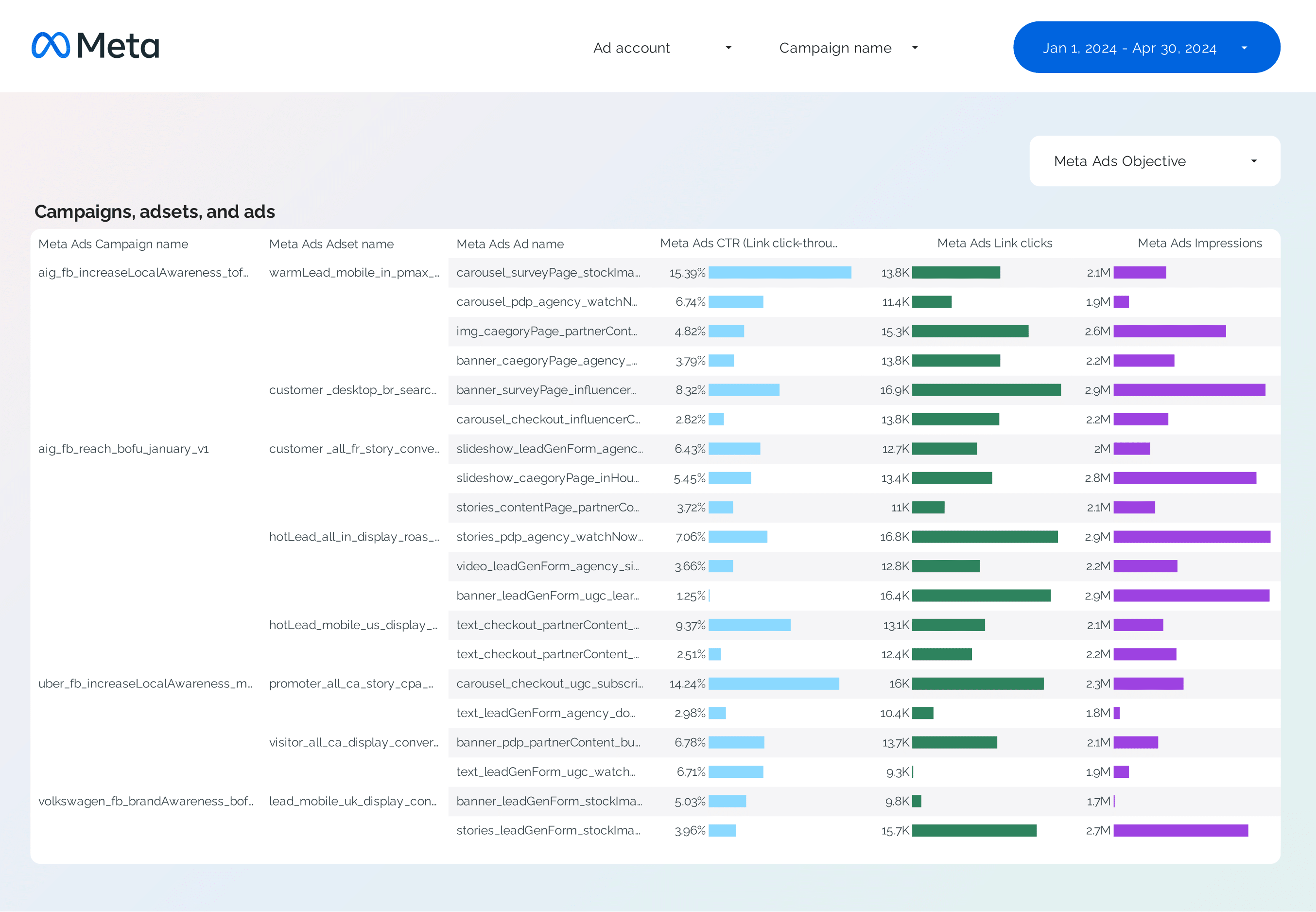
Facebook Ads Campaign performance Dashboard template
This Facebook Ads Campaign Performance Dashboard template provides a detailed overview of your PPC campaigns. It is designed to help you monitor and analyze the performance of your Facebook Ads in real-time.
Features include:
- Impressions and Reach: Track the number of times your ads are displayed and the unique users reached.
- Click-Through Rate (CTR): Measure the percentage of users who clicked on your ad after seeing it.
- Conversion Tracking: Monitor the actions users take after interacting with your ad, such as purchases or sign-ups.
- Cost Analysis: Evaluate your ad spend, cost per click (CPC), and cost per acquisition (CPA).
- Audience Insights: Analyze demographic data to understand who is engaging with your ads.
This dashboard is essential for marketers looking to optimize their Facebook Ads strategy and maximize ROI.
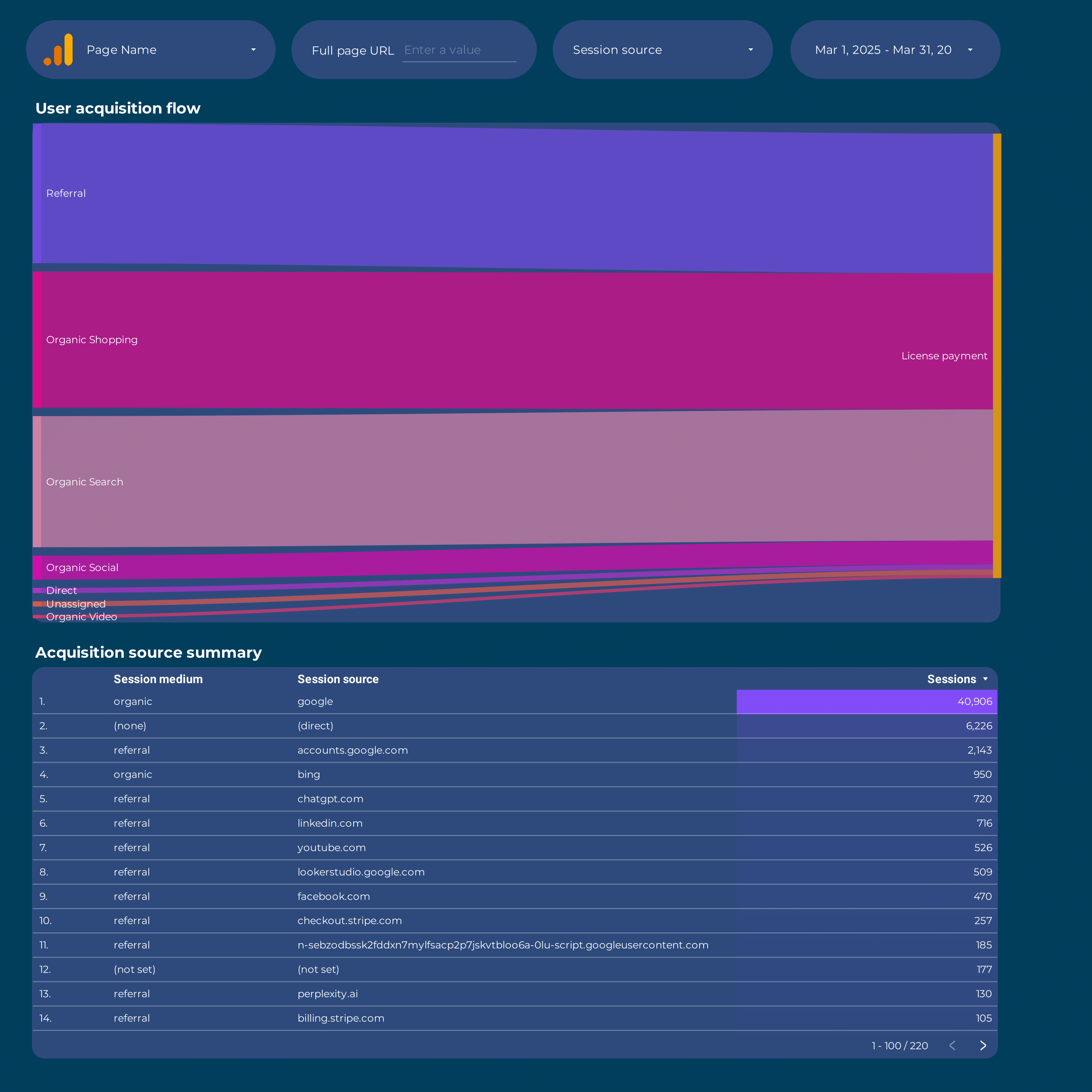
Google Analytics 4 Attribution Dashboard template
The Google Analytics 4 Attribution Dashboard template provides a detailed view of your marketing channels’ performance. This dashboard is designed to help marketers understand the attribution paths that lead to conversions, offering insights into how different channels contribute to your business goals.
With this dashboard, you can:
- Analyze multi-channel attribution to see how various marketing efforts work together.
- Track conversion paths to identify the most effective sequences of interactions.
- Evaluate the impact of each channel on your overall marketing strategy.
Utilize this template to gain a deeper understanding of your customer journey and optimize your marketing strategies based on data-driven insights.
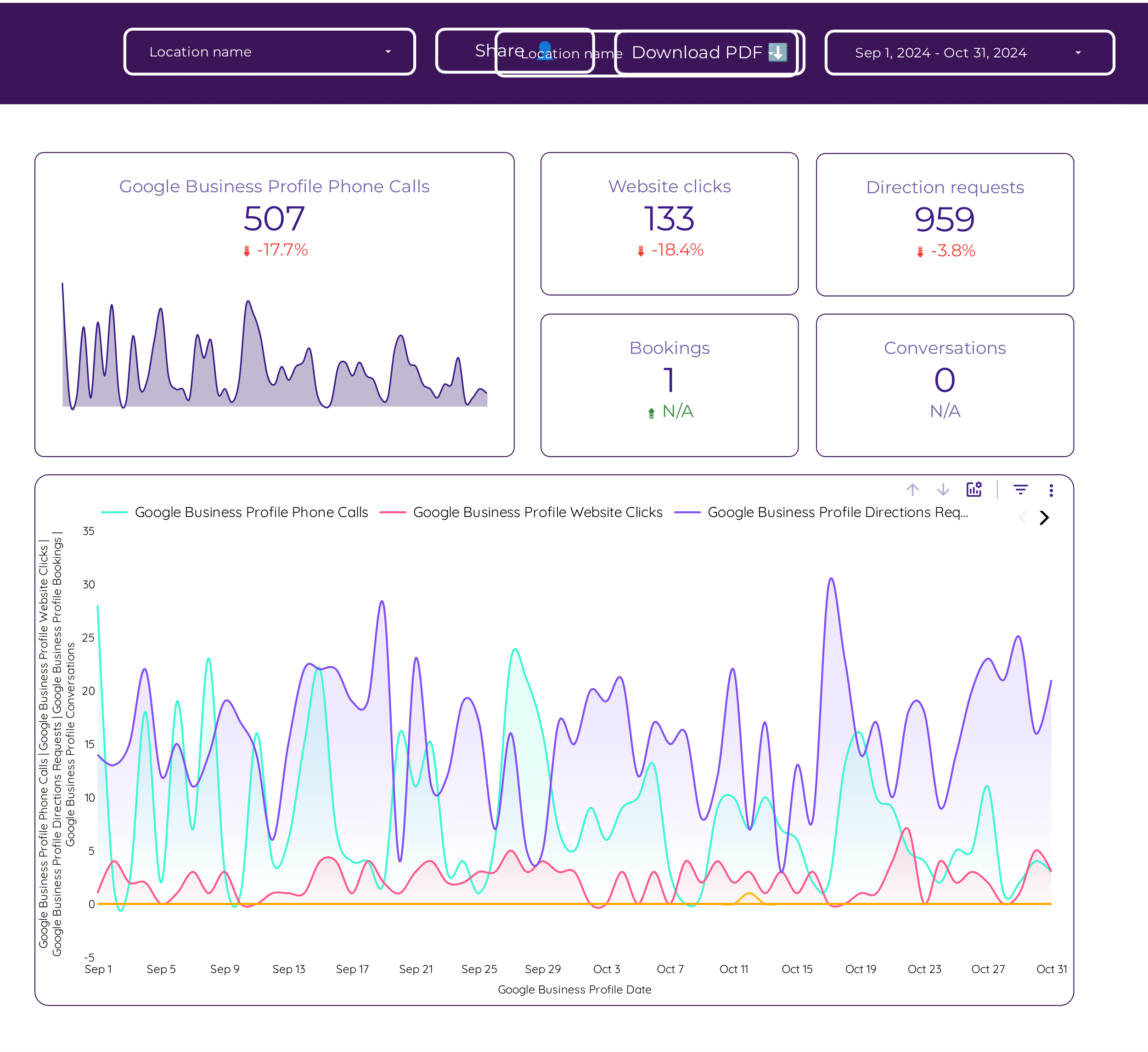
Local SEO Dashboard template
The Local SEO Dashboard template is designed to streamline the management of your Google Business Profile and enhance your local search visibility. This tool provides a centralized platform to monitor and analyze your local SEO performance.
With this dashboard, you can:
- Track your Google Business Profile metrics, including views, clicks, and customer actions.
- Monitor local search rankings and identify trends over time.
- Analyze customer reviews and ratings to understand public perception.
- Identify opportunities for improvement in your local SEO strategy.
Utilize this dashboard to maintain a competitive edge in local search results and ensure your business is easily discoverable by potential customers.
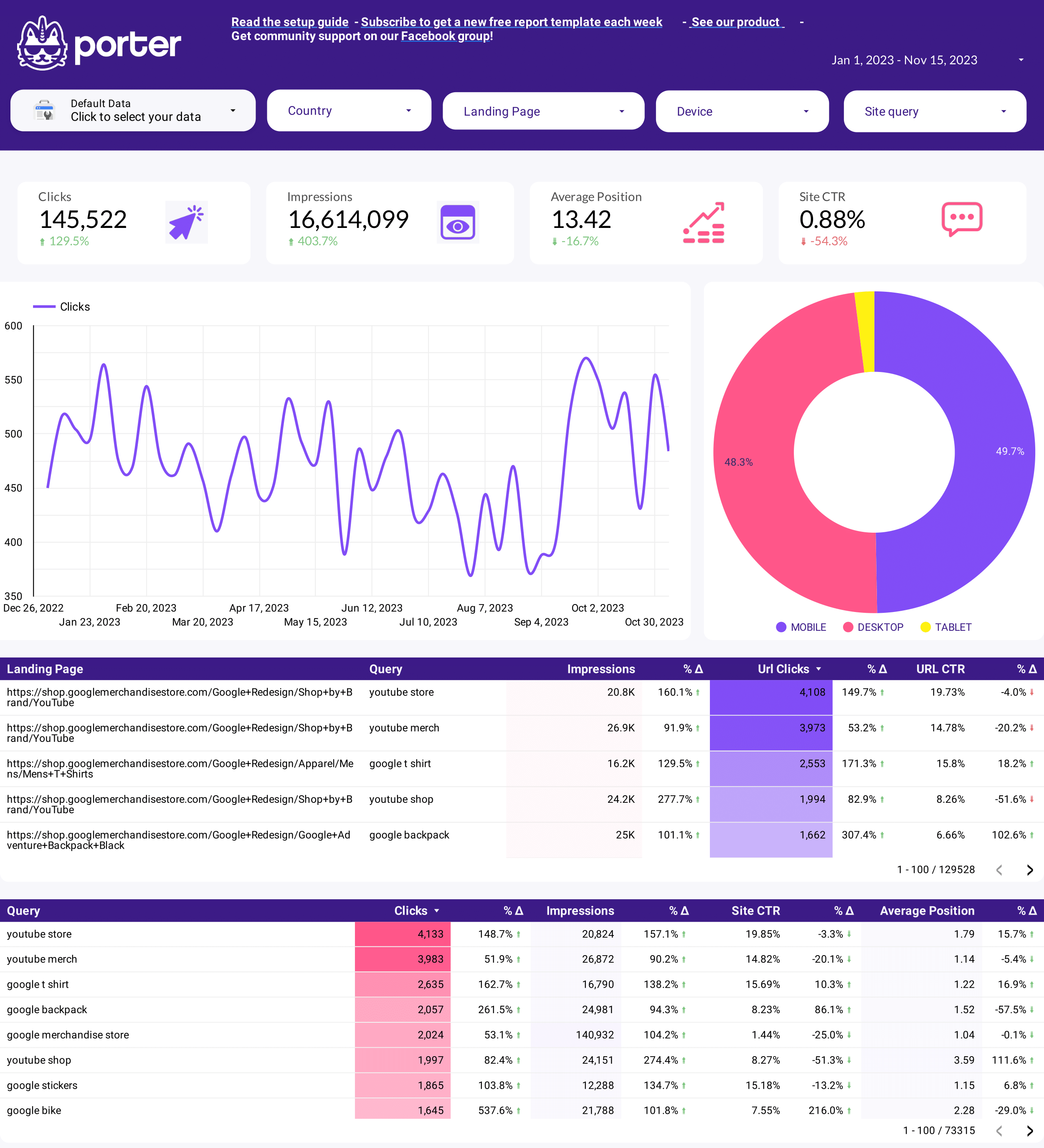
SEO Dashboard template
The SEO Dashboard Template is designed to streamline your SEO strategy by integrating data from Google Search Console and other analytics tools. This template provides a centralized view of your website’s performance metrics, enabling data-driven decisions for content marketing and branding.
Features include:
- Google Search Console Integration: Automatically pull search performance data to monitor clicks, impressions, and average position.
- Content Performance Analysis: Evaluate the effectiveness of your content marketing efforts by tracking page views, bounce rates, and user engagement.
- Brand Visibility Metrics: Assess your brand’s online presence with insights into search queries and audience demographics.
Utilize this dashboard to align your SEO efforts with business objectives, ensuring a cohesive approach to improving search rankings and online visibility.
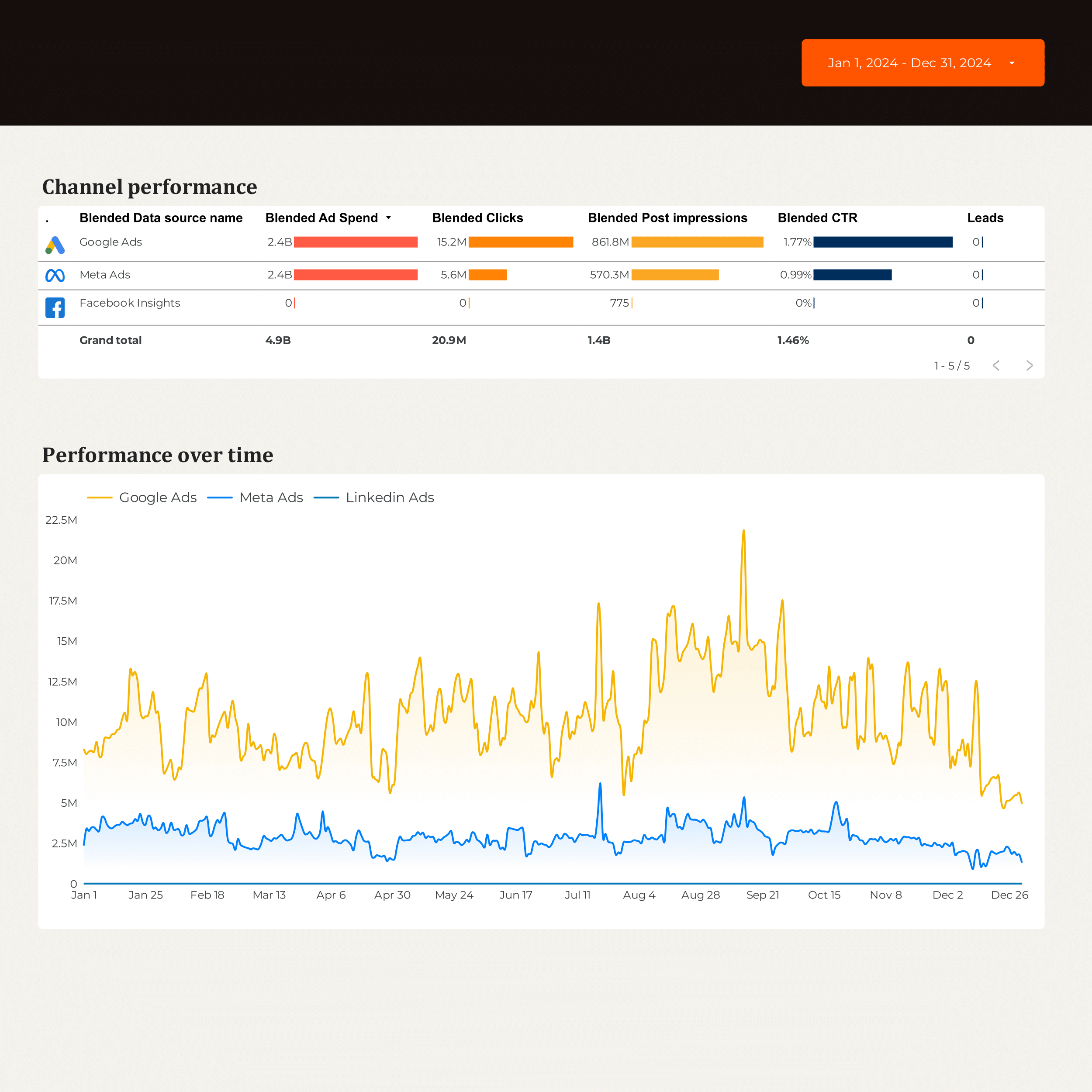
B2B Marketing performance Dashboard template
The B2B Marketing Performance Dashboard template provides a centralized view of your marketing efforts across multiple channels. This dashboard integrates data from CRM systems, Email Marketing platforms, and advertising networks to offer a complete picture of your marketing performance.
Track and analyze data from:
- HubSpot for CRM insights and lead management.
- Google Ads and Facebook Ads for PPC campaign performance.
- LinkedIn Ads to monitor B2B engagement and conversions.
- Google Analytics 4 for web traffic and user behavior analysis.
This dashboard template allows you to monitor campaign performance, lead generation, and ROI metrics, providing actionable insights for strategic decision-making.
